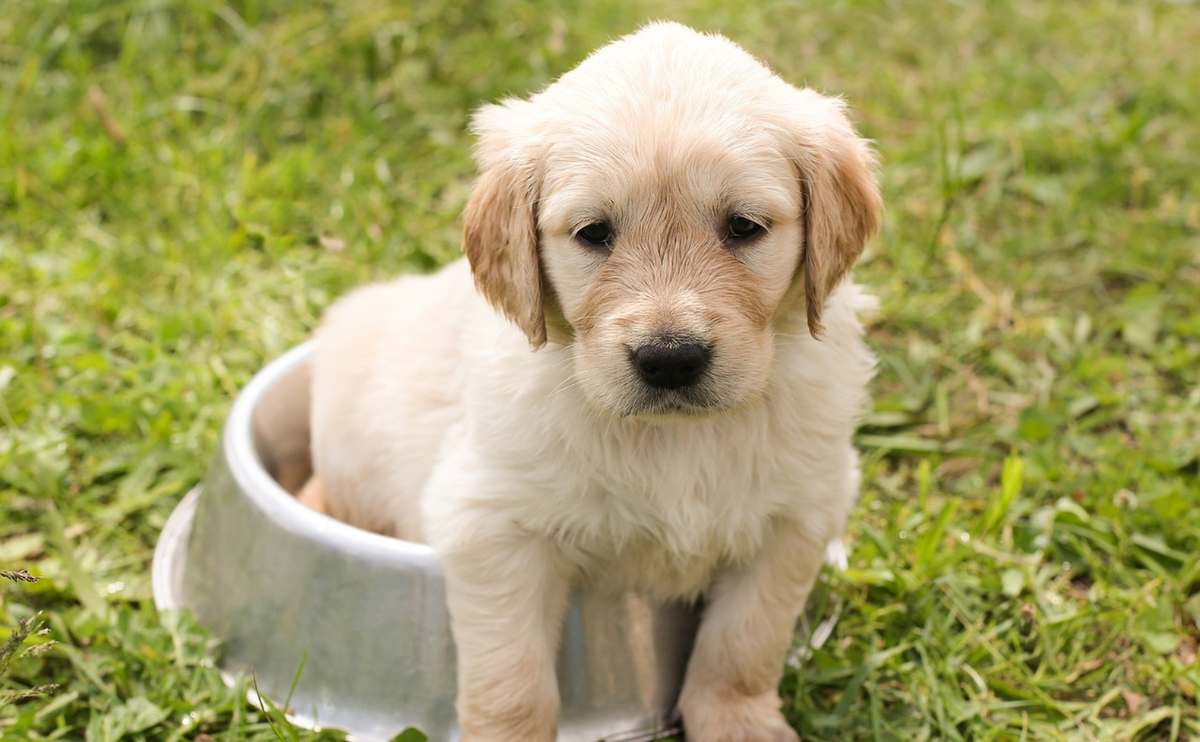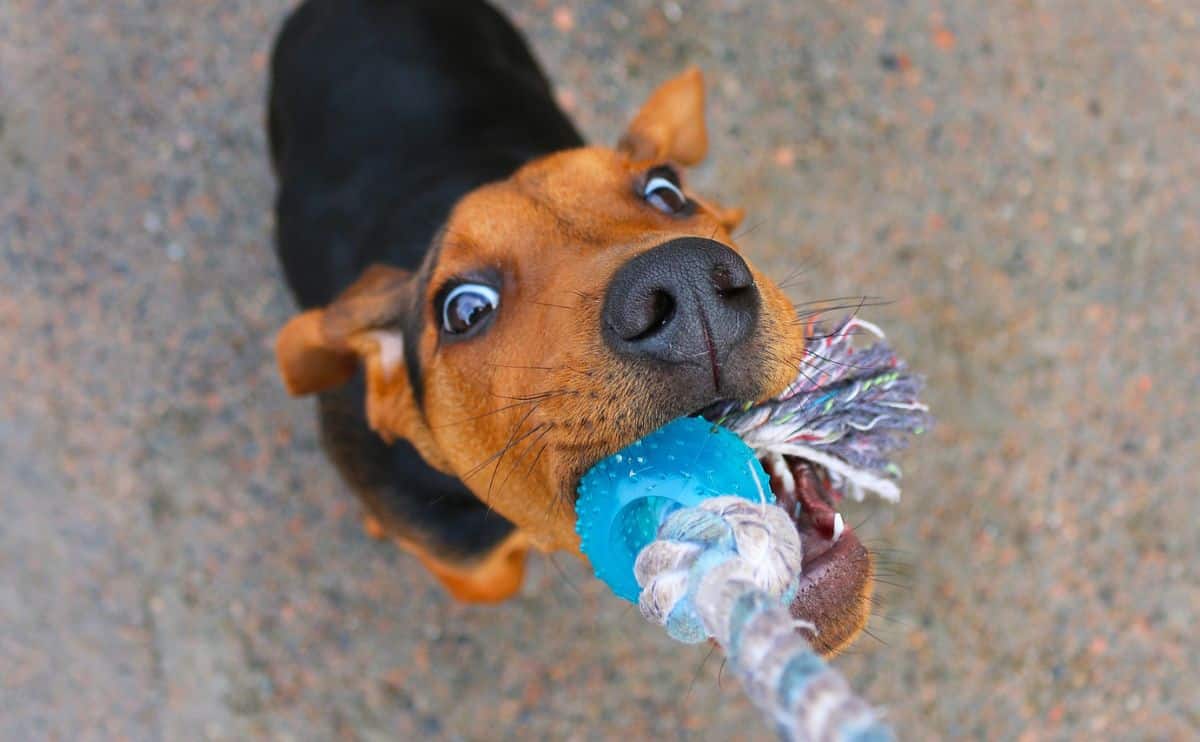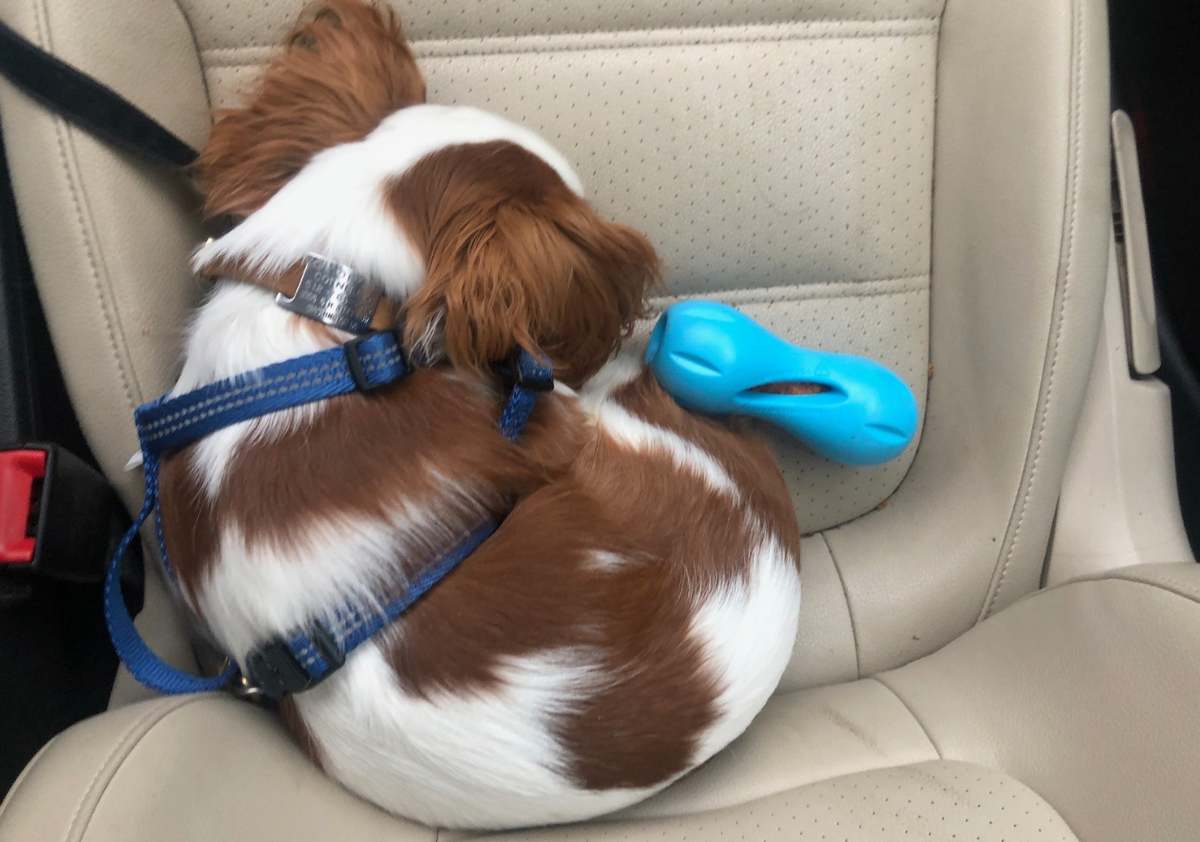Common Puppy Mistakes: 7 Things New Owners Need To Know
When you purchase through links on our site, we may earn a commission. Here’s how it works.

The first few months of having a puppy can be tiring and frustrating. It’s common during this time, even for those who have had puppies before, to make some common mistakes. While all new parents make mistakes, I’ll help you recognize them so you can raise a healthy, well-balanced dog.
Table of Contents
Top 7 Common Puppy Mistakes
Here are some of the most common puppy mistakes that owners often make when they are not armed with the correct first-time puppy-parent tips.
1. Giving Your Puppy Too Much Freedom
Puppies need constant supervision and small boundaries. Without it, they can get into a lot of trouble and develop bad behaviors, like chewing on furniture, ripping up clothing, biting, nipping, going potty inside, and more.
Many professional dog trainers recommend attaching a puppy training line or house line to your pup’s collar and leaving it there all the time. You can purchase a line or use a standard leash, but be sure to cut the handle off so it doesn’t get caught on things around your house. A house line allows you to get control of your puppy immediately and redirect unwanted behaviors. You don’t use the house line as a leash; rather, it just drags around on the floor. When you need to stop your puppy from doing something, you simply step on the line or grab it.
It’s equally important for you to enclose your puppy in the room with you, which may require the use of several dog gates around your house. Too much space to roam away from you is too much freedom.
When you can’t supervise your puppy, it’s crate time. How long do you need to use a house line? For months — until you find yourself not needing it to get your puppy under control.
2. Failing To Crate Train Properly
Many puppy owners choose to crate train their dogs. Crate training is important for many reasons, primarily because it provides your pup with a safe personal space where he cannot harm himself or get into troubling behaviors when you’re not watching him. When trained properly, a puppy or dog will consider his crate a relaxing place to rest.
Many owners start with crating at night, which isn’t necessarily the ideal time. Unfortunately, many dog owners give up after their first sleepless night. It’s not uncommon for puppies to cry through the night when placed in their crate the first few times. Many new dog parents find this crying heartbreaking and decide to take their puppy out and let them sleep on their bed instead. While allowing your dog to sleep on your bed is not necessarily a bad idea, letting a puppy sleep on your bed isn’t ideal. Puppies don’t have the bladder control that older dogs have, and puppies that fall asleep in your bed may soon result in accidents.
Accidents are not the biggest concern with taking a puppy out of his crate. Responding to a puppy’s cries when they are unhappy in their crate lets your dog know that they can cry for you and get what they want. This behavior may make you feel needed, but it can become annoying and problematic when your dog continues it in their adult years, particularly if you live in an apartment or a townhouse.
If your puppy cries when placed in their crate at night, resist the urge to rescue them and instead try to help them fall asleep by covering their cage with a blanket to create complete darkness. If you feel that your puppy may be “missing home,” you can try placing a ticking clock outside their crate or playing a heartbeat sound effect to soothe them. The best thing you can do for your puppy is to let him fall asleep by himself in the long run.
3. Waiting To Start Puppy Training
Puppies as young as eight weeks old are entirely capable of learning obedience commands. Begin with the basics of sit, stay, down, and come. Early training gives your puppy focus and confidence. It makes your little furball realize that there are rules and that you’re in charge. Early training also sets a foundation for a well-mannered dog down the road. Use rewards and praise rather than negative measures to train your puppy.
4. Not Socializing Your Puppy
Socializing your puppy with other dogs and people is particularly crucial to your puppy’s behavioral development. Research has shown that the key window for socialization is between eight and 16 weeks of age. It’s paramount to raising a well-adjusted and happy dog who interacts with others appropriately.
Although puppies can contract diseases by picking up small amounts of excrement left behind by sick dogs in public places, the American Veterinary Medical Association (AVMA) states that dog behavior problems from lack of puppy socialization are of greater concern than the chance of contracting a disease in a public place.
Additionally, being aware of puppy fear periods can help you understand and manage behaviors that may arise during these sensitive developmental stages.
5. Failing To Establish A Routine
Dogs thrive on routine, and the earlier you establish a reliable one, the better. It helps puppies to know when they’ll sleep, play, eat, go on walks, and go potty. A routine leads to less confusion and stress and helps build confidence in your furry bundle of joy. It’s also a huge bonus when house training, so your pup eventually learns when it’s time to go and when it’s not.
6. Free Feeding
Don’t just place a bowl of puppy food down and leave it for your little buddy to graze on all day. It’s important for dogs to know there are set mealtimes. For puppies, this helps make housetraining easier so you can get on a consistent and reliable potty-time schedule. As dogs get older, free feeding can lead to weight gain.
7. Feeding Table Scraps
Feeding table scraps is one of the most challenging habits to break, which is why you should never start it. Eating at a family dinner can make you feel guilty, particularly if your nine-week-old puppy is watching and drooling over your pot roast.
It is important not to give in to feeding table scraps because once you feed your puppy one morsel of food, they will come to expect food every time you eat at the table.
A lot of human foods are unhealthy for dogs and the cause of many common ailments, including pancreatitis. It is also extremely bothersome when the dog is older and takes to drooling on dinner guests. Avoid this situation altogether by teaching your puppy to go to their crate during mealtimes.
Puppyhood Is The Best Time To Consider Pet Insurance
As a puppy, your dog has probably not shown significant health concerns. Since most pet insurance companies do not cover pre-existing conditions, the younger your dog is when you sign up, the better coverage you will likely receive throughout his lifetime. Further, pet insurance can help support you financially during the unpredictable puppy years when dogs are more likely to chew on things they shouldn’t and run into dangerous situations. Check out our pet insurance 101 guide to learn more and determine whether pet insurance is worth it for your puppy.
Frequently Asked Questions
New puppy owners have a ton of questions about raising their dogs the right way. Here are some of the most common questions they ask. Don’t see yours here? Ask me in our comments.
Why Is Raising A Puppy So Hard?
Many people don’t consider how much work it takes to raise a puppy. If you’re committed to doing it the right way, it takes more time, energy, and patience than you ever expected. Why? Puppies are the equivalent of human toddlers. They require a lot from you to become responsible, well-behaved adult dogs.
What Is The Most Difficult Stage Of A Puppy?
Raising puppies is challenging for sure, but the most difficult stage depends on each dog. From what I’ve found, many puppy owners consider the ages between 2-5 months the most difficult. This phase is when you’re potty and crate training and can’t take your eyes off of your puppy. However, others say adolescence can be equally challenging (sounds like raising human kids, right?). Starting around 8 months of age, some dogs go through a lot of hormonal changes and can get headstrong about their independence, yet they still need some supervision at this age.
At What Age Do Puppies Get Easier?
Many puppy owners say there’s a sweet spot between 5 and 8 months (the exact age depends on the breed and individual dog) when they’re not dealing with the constant hassles of young puppy training. This period is also when major teething issues have subsided.
Is Cuddling A Puppy Okay?
Contrary to popular past beliefs, picking up and cuddling your puppy is perfectly healthy for both you and your tiny furry friend. It doesn’t cause issues of your puppy or dog feeling dominant over you. Puppy cuddles let your new family member know you love him and that he’s safe with you. However, don’t overdo it. For example, your puppy needs to face new experiences, including other dogs and humans, without you over-coddling him. Let your puppy explore the world and gain independence.
Don’t Worry, Mistakes Happen
Don’t beat yourself up for being a bad pet parent. Mistakes are inevitable, and give yourself (and your dog) grace and room to grow. Healthy habits are not formed overnight. They take persistence and practice, paying off in the end. If you need additional help, we recommend trying online dog training as a great way to learn the basics on your own schedule at home.
Why Trust Canine Journal?
Sally has over 20 years of experience in human health sciences communications, including 10 years as an expert on pet health conditions and treatment. She’s also spent over a decade researching dog behavior and training methods as part of an expert team at Canine Journal. As dedicated canine professionals and long-time dog owners, we test and research the best pet products and solutions to common dog concerns, not only for our own pups but for all of our readers.



